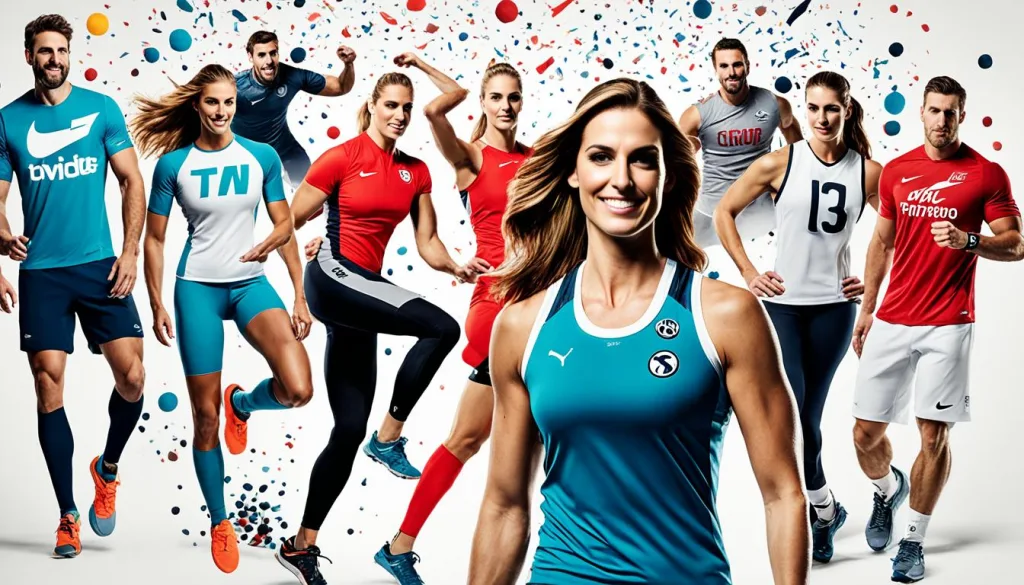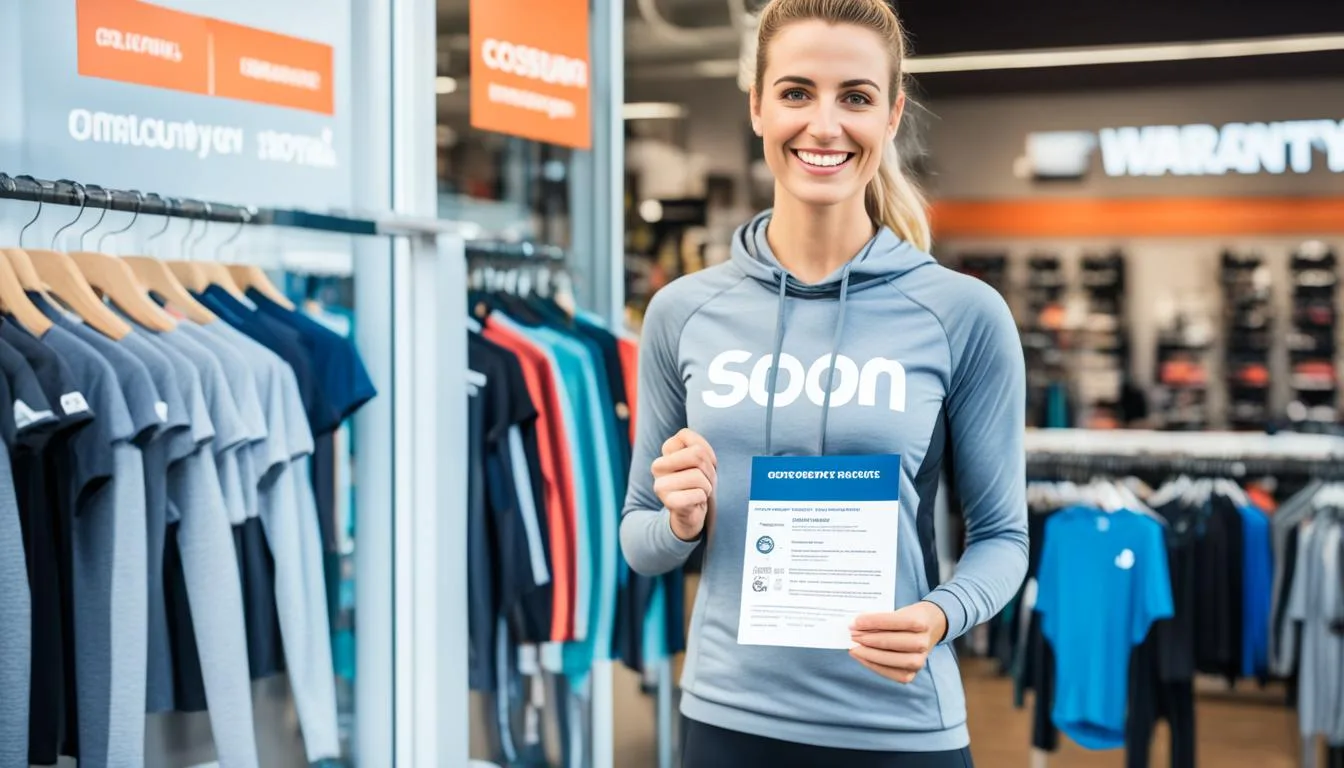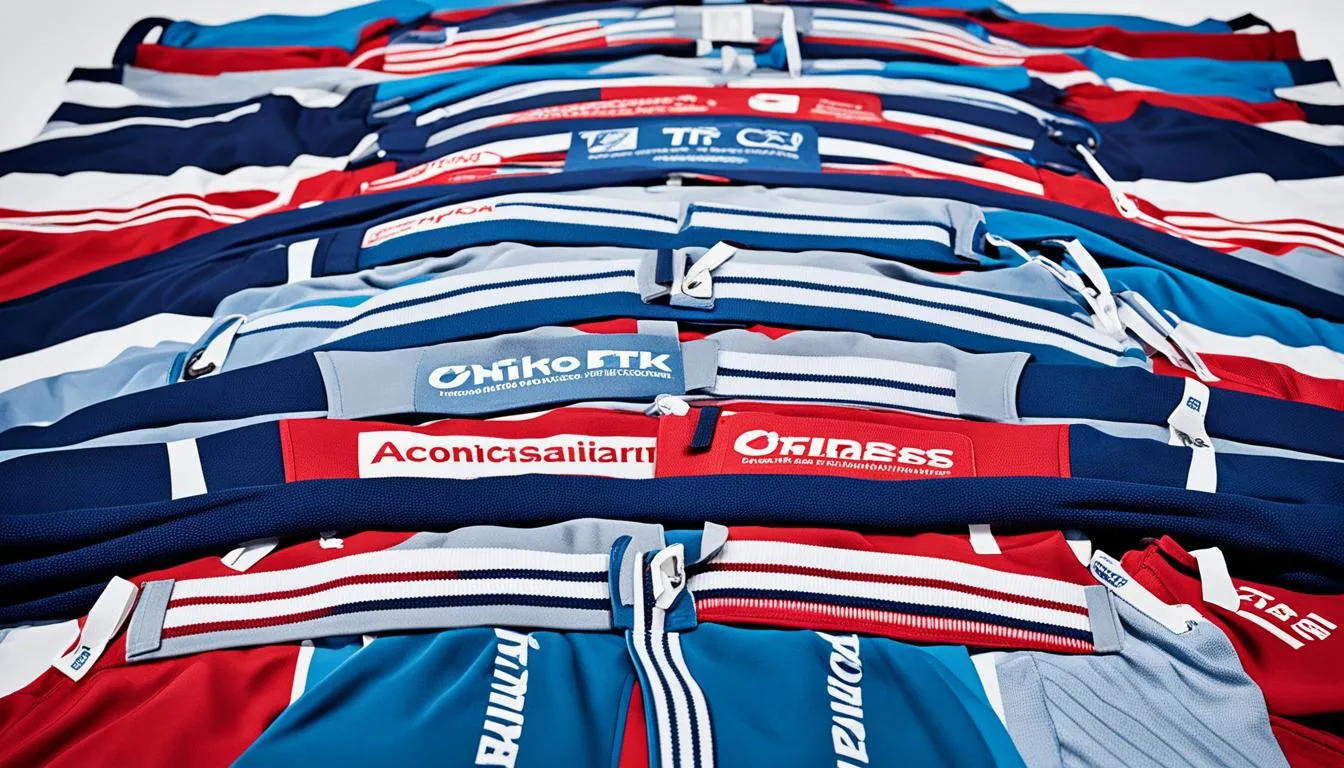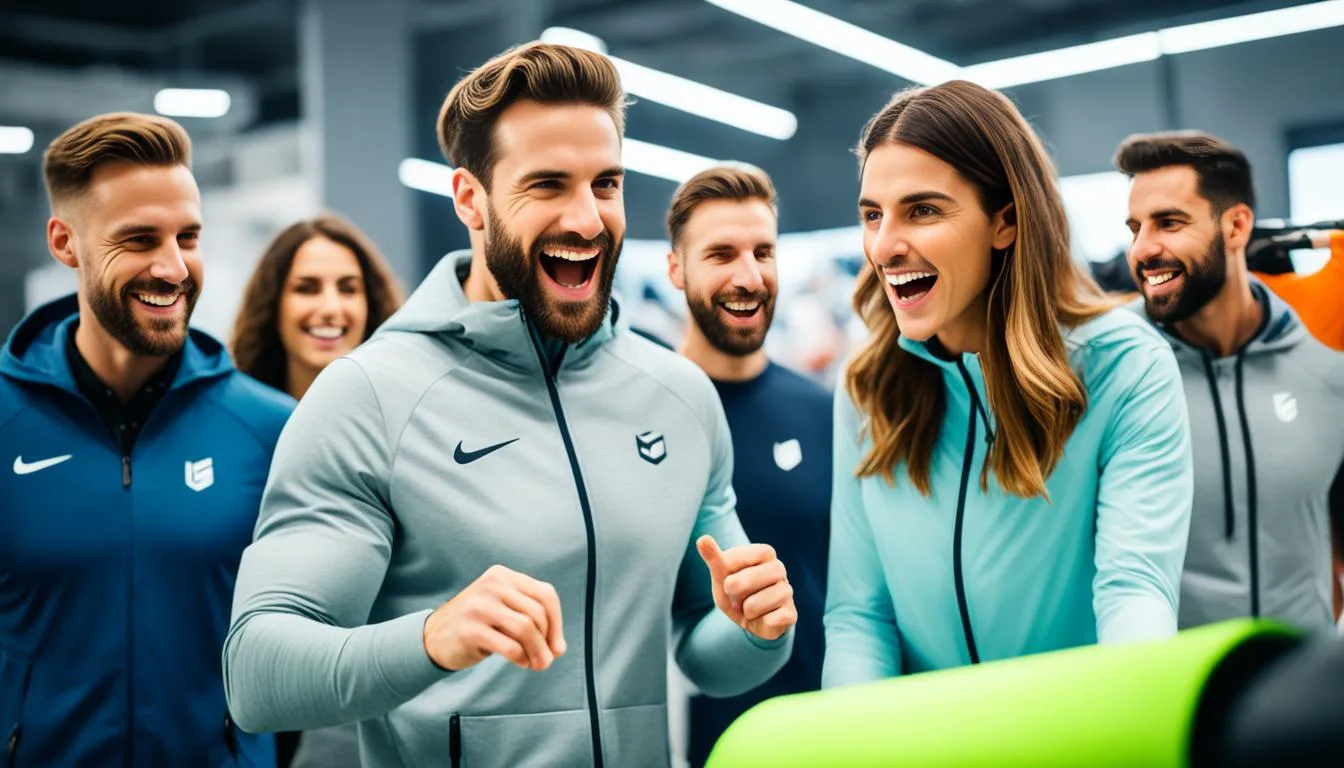Exploring the Influence of Social Proof in Sportswear Purchasing
Connect With Us Today
Consider us for your next production run. Why wait? Send us your questions here.
The world of sportswear sales is always changing. Consumer behavior in sportswear purchasing is now more influenced by social proof. This idea means people look at what others do or say to decide what they should do. Now, sportswear brands use positive feedback and expert approval to affect sportswear purchase decisions.
Sports brand social proof can come from famous athletes or from what many customers say about a product. These endorsements are key in helping customers decide what to buy1. The role of social proof in buying sportswear is crucial for understanding sportswear shopping trends and successful sportswear marketing strategies.
Brands need to use different kinds of social proof, like reviews from users and stars’ approvals, to affect social influence in sportswear buying1. Sharing stats like how many people liked a product helps build trust in a brand. This is very important in the sportswear market1.
Key Takeaways
- Social proof shapes customer views and purchases within the sportswear industry1.
- A myriad of social proofs like expert opinions and user testimonials are instrumental for sportswear brands1.
- Consumer’s dependence on external validation drives the efficacy of reviews and ratings in buying sportswear1.
- Social media’s influence through influencers and athletes plays a significant role in sportswear buying trends1.
- Statistical success indicators such as number of customers and products sold are compelling tools in sportswear social proof1.
Understanding Social Proof’s Role in Consumer Behavior
Social proof is key to knowing why people buy things in our connected world. It shows why we look to others when we’re not sure what to do. Reviews and testimonials online greatly influence what we decide to buy.

Psychological Underpinnings of Social Proof
At its heart, social proof taps into our need to follow what others do. This urge is strong when we feel a connection to the people or groups we see. We’re more likely to copy behaviors that seem popular or successful, thinking they’re the right choice.2
This idea is backed by evidence that social proof really persuades us when we can relate to others like us or those we look up to2.
Consumer Dependence on External Validation
With so many choices, consumers often lean on others’ experiences to help them decide. Influential endorsements, content made by users, and social media interactions all shape our buying decisions3. Businesses are expected to respond to customer comments online, building trust.3
The jump in using digital tools since the pandemic has made this even more common. Now, 51% of U.S. adults think their lives will stay changed even after the pandemic4.
A Look at Social Proof Through Reviews and Testimonials
Reviews and testimonials are powerful forms of social proof. They work like personal recommendations that can change how consumers see things. Relevant case studies make people more likely to follow along2.
Building a sense of community within a target market makes social proof even more potent2. Showing real-life examples of businesses being open and engaging online proves how strong social proof can be3.
| Aspect of Social Proof | Impact on Consumer Behavior |
|---|---|
| Engagement on Social Media (Likes, Comments) | Indicates popularity and credibility, swaying purchasing decisions3 |
| User-Generated Content | Serves as authentic endorsements, resonating with potential buyers3 |
| Endorsements and Testimonials | Provide evidence of benefits, reinforcing credibility and encouraging action2 |
| Community Engagement | Creates a shared identity and language, enhancing the credibility of social proof2 |
Experts predict a “tele-everything” world by 2025 due to increased reliance on technology for work, education, and social interactions – a paradigm shift that will likely alter consumer behavior indefinitely4.
Studying social proof in consumer behavior is ongoing, and businesses should pay attention. By embracing these changes and using focused tactics, businesses can greatly affect consumer decisions and their own success.
Exploring the Influence of Social Proof in Sportswear Purchasing
Decathlon is huge, found in 52 countries and running 1,600 stores worldwide5. With more than 10,000 products for 80 sports, it’s clear they’re important in sportswear5. This shows how social proof can really influence what sports gear we buy, especially online.
Decathlon saw a 1.5% rise in people adding items to their cart because of social proof5. More people click when they see customer reviews, showing how important social proof is6. By using social proof, Decathlon’s sales and revenue increased by 2.4% and 1.3%5.
Social proof really works for more affordable sportswear. Items less than 10 pounds got more attention than pricier things like bikes5. It seems the price can change how effective social proof is, pointing to different strategies for different items.
Regular buyers at Decathlon’s site also bought more often after seeing social proof. They clicked 2.8% more, bought 3.3% more, and spent 2.8% more5.
Customer reviews are key to buying sportswear. Many base their choices on positive reviews, a modern version of recommendations6. Showing these reviews well can lead to more sales, upping brand trust and credibility6.
Brands using social proof get more engagement than those who don’t. Things like likes, shares, and positive comments help make products more visible and trusted6.
User-generated content (UGC) makes brands more transparent and authentic. Tools like Google Analytics are crucial for understanding this engagement and improving marketing strategies6.
- Noteworthy Developments:
- Brand engagement via UGC sharing
- Tracking digital footprints through analytics tools
- Localized strategies for varying price points

Sportswear brands are also focusing on mobile apps. Using social proof has boosted app downloads, offering a tailored shopping experience6. This helps brands connect with tech-savvy customers, standing out in a crowded market.
Looking at emerging trends, brands can see how social proof influences sportswear choices. Combining a vast product range with social proof is key to winning customer loyalty and boosting sales6.
Sportswear Brands and Social Media Proof
The world of sports marketing is quickly changing. The sports technology market is expected to rise to 55.14 billion USD by 20307. Social media plays a big role in this change. It gives sportswear brands a way to connect with their fans7. Using social media influencers and the power of likes and followers are key for influencing what people buy.
Leveraging Social Media Influencers and Athlete Endorsements
Sportswear companies are using social media stars and athletes more and more. They want to make a real connection with their audience7. Big brands like Nike and Adidas are good at this. They mix influencer partnerships into their marketing to get more engagement and sales.
The Impact of Followers and Likes on Purchasing Behavior
Online endorsements are very powerful today. Followers and likes can really sway what sportswear people choose to buy. Through apps and live streams, brands can offer special content. This helps turn online engagement into actual sales7.
Case Studies: How Leading Sportswear Brands Harness Social Proof
Top sportswear brands know how to use content made by users and interactive media to build community and loyalty7. They pull consumers into a brand experience that makes them loyal. Things like quizzes, polls, and videos get fans more involved and loyal to the brand7.
| Brand Strategy | Influencer Engagement | Customer Interaction | Sales Impact |
|---|---|---|---|
| Exclusive App Content | High-profile Athlete Collaborations | Quizzes, Polls, Videos | Increased Purchase Intention |
| Live Streaming Events | Targeted Product Endorsements | User-Generated Content | Strengthened Brand Loyalty |
Real-life Testimonials and User-Generated Content in Sportswear Marketing
The importance of real-life testimonials in sportswear marketing is huge today. Over 4.76 billion people use social media8. Customer reviews and user content in promotions give strong social proof. This helps attract new buyers using the experiences of others. Instagram’s high-quality images make this even more effective. It lets brands tell powerful visual stories8.
Sportswear UGC campaigns use the power of shared consumer stories. It turns individual experiences into a common story for the fitness world. Using sportswear brand testimonials shows the product’s quality and makes the brand more trustworthy. By sharing real user stories, companies connect advertising and personal recommendations8.
Let’s not forget the social networks like Facebook and YouTube from the early 2000s. These platforms are great for sportswear brand testimonials8. Here, user stories can quickly spread widely. This shows the power of word-of-mouth in today’s connected world8.
| Marketing Strategy | User Engagement | Brand Impact |
|---|---|---|
| User Testimonials | High Authenticity | Trust and Credibility |
| UGC Campaigns | Community Building | Increased Brand Loyalty |
| Social Media Reviews | Real-time Feedback | Immediate Consumer Insights |
In 2015, the world used 22% of online time on networks like Twitter and LinkedIn8. Sportswear marketing now focuses on sharing real-life stories and achievements. This is done on popular platforms. It’s the realness that makes brands stand out and win the market
- Accessibility to diverse customer testimonials
- Engagement through compelling content creation
- Positive feedback loop via social shares and likes
Using real-life testimonials and user-generated content is key in sportswear marketing today. It builds trust and strengthens the brand identity. This strategy connects well with today’s consumers, who value authenticity in the digital marketplace
Conclusion
This article shows how key social proof is in buying sportswear. The link between social proof and sportswear purchases is huge. It’s a main part in today’s sportswear marketing plans. The relationship between the kind of influencers and their followers is important9.
Macro, micro, and nano influencers each have a special role. They influence shopper choices by how well they engage and are seen as trustworthy9.
Our findings show that good influencer marketing increases brand awareness. It also changes what people want to buy. These targeted efforts build strong brand loyalty, showing how crucial influencers are for sportswear brands wanting to stand out9.
Furthermore, influencers’ trustworthiness and know-how are vital. They can shift how consumers feel and act towards brands, as shown by the Source Credibility Model9.
The role of social proof in buying habits needs constant monitoring. Brands aiming to use social proof must choose their influencer partners wisely. This helps to truly connect with audiences. Doing this well reinforces a brand’s reputation in sportswear and lifts sales, proving these strategies work well in a competitive market9.
FAQ
What is social proof and how does it influence sportswear purchasing?
Why is it important to understand consumer behavior in sportswear purchasing?
What are the psychological underpinnings of social proof?
How does consumer dependence on external validation relate to social proof?
How does social proof through reviews and testimonials influence consumer behavior?
How does social proof influence sportswear purchasing decisions?
How do sportswear brands leverage social media influencers and athlete endorsements to create social proof?
What is the impact of followers and likes on purchasing behavior in the context of sportswear?
Can you provide examples of how leading sportswear brands harness social proof?
How do sportswear brands use real-life testimonials and user-generated content in their marketing?
Source Links
- https://abmatic.ai/blog/how-to-use-social-proof-to-boost-conversions
- https://www.linkedin.com/pulse/social-proof-its-what-you-say-counts-howey-business-consultant
- https://www.sprinklr.com/blog/social-media-customer-behavior/
- https://www.pewresearch.org/internet/2021/02/18/experts-say-the-new-normal-in-2025-will-be-far-more-tech-driven-presenting-more-big-challenges/
- https://www.abtasty.com/resources/decathlon-social-proof/
- https://www.sproutsocial.com/glossary/social-proof/
- https://onlinesportmanagement.ku.edu/community/sports-marketing-trends
- https://en.wikipedia.org/wiki/Social_media
- https://www.abacademies.org/articles/the-impact-of-social-media-influencer-marketing-on-consumer-behavior-and-brand-loyalty-16441.html
Latest News
How Collaboration Shapes Consumer Preferences in Sportswear
Navigating Consumer Rights and Warranties in Sportswear Sales
Artificial Intelligence in Fashion Forecasting and Trend Analysis
The Shift Towards Inclusive Sizing in Sportswear: Consumer Reactions
The Global Expansion of Luxury Sportswear Brands
From Sketch to Gym: The Design Process of Fashionable Sportswear
Understanding the Role of Trade Associations in Sportswear Compliance
How Economic Trends Influence Consumer Spending on Sportswear
Learning from Successful Global Market Entries
Best Practices for Managing Cross-Cultural Teams
Using Technology to Fight Counterfeit Fashion Products
Carbon Nanotube Fabrics for Superior Strength and Flexibility
The Growth of Fitness Tracking Apparel in Health and Wellness
Exploring the Influence of Social Proof in Sportswear Purchasing
Strategies for Managing Compliance in a Multinational Operation
Trends in Global Footwear: Performance Meets Lifestyle
The Role of Artificial Intelligence in Tracking Supply Chain Operations
Evaluating the Success of Sportswear Collaborative Projects
Evaluating the Potential of Emerging Markets
Global Shifts Towards Gender-Neutral Sportswear
Share This Article
Latest Articles



















